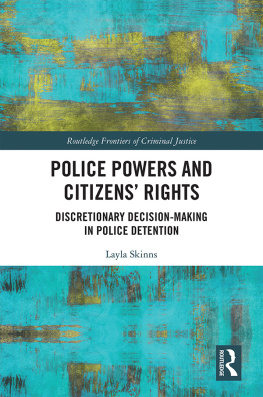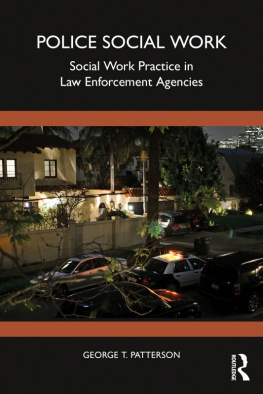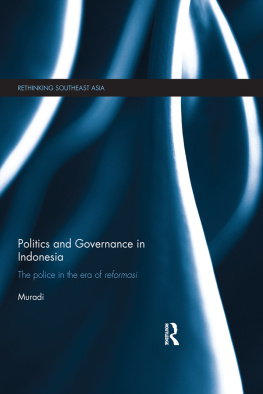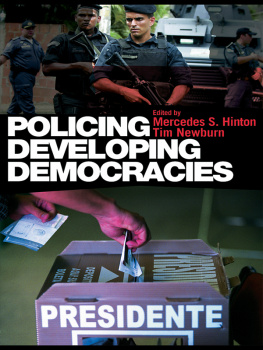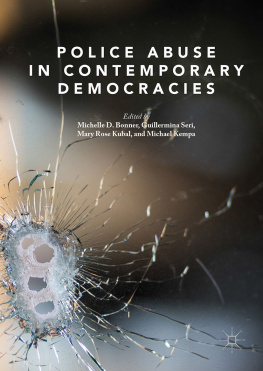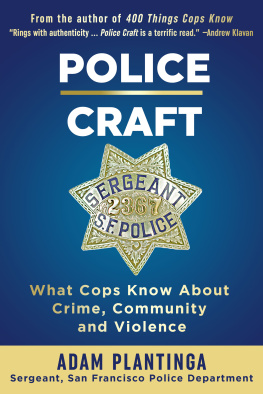Governing the Police
Governing the Police
Experience in Six Democracies
David H. Bayley
and
Philip C. Stenning
First published 2016 by Transaction Publishers
Published 2017 by Routledge
2 Park Square, Milton Park, Abingdon, Oxon OX14 4RN
711 Third Avenue, New York, NY 10017, USA
Routledge is an imprint of the Taylor & Francis Group, an informa business
Copyright 2016 by Taylor & Francis.
All rights reserved. No part of this book may be reprinted or reproduced or utilised in any form or by any electronic, mechanical, or other means, now known or hereafter invented, including photocopying and recording, or in any information storage or retrieval system, without permission in writing from the publishers.
Notice:
Product or corporate names may be trademarks or registered trademarks, and are used only for identification and explanation without intent to infringe.
Library of Congress Catalog Number: 2015047582
Library of Congress Cataloging-in-Publication Data
Names: Bayley, David H., author. | Stenning, Philip C.
Title: Governing the police : experience in six democratic countries / by David H. Bayley and Philip C. Stenning.
Description: New Brunswick (USA) : Transaction Publishers, 2016. |
Includes bibliographical references and index.
Identifiers: LCCN 2015047582 (print) | LCCN 2016004489
(ebook) | ISBN 9781412862813 (hardcover) | ISBN 9781412862318
(eBook) | ISBN 9781412862318 Subjects: LCSH: Police..
Classification: LCC HV7921 .B353 2016 (print) | LCC HV7921 (ebook) | DDC 353.3/6--dc23
LC record available at http://lccn.loc.gov/
2015047582
ISBN 13: 978-1-4128-6281-3 (hbk)
ISBN 13: 978-1-4128-6338-4 (pbk)
To my daughters Jennifer and Tracy, for their love, understanding, and good sense.
David H. Bayley
In memory of my early mentor, the late Professor John Edwards (19181994), who inspired me to pursue an academic career, and instilled in me values which have guided me throughout it.
Philip C. Stenning
Contents
This book could not have been written without the generous co-operation of senior police officers, both serving and retired, in Australia, Britain, Canada, India, New Zealand, and the United States. To say they were interested in the topic would be an understatement. Uniformly they stressed the importance of managing their relationship with political supervisors. They all had stories to tell, not necessarily critical. For their insights, candor, and willingness to be interviewed, as well as their assistance in putting us in touch with other members of their elite group who agreed to be interviewed, we are enormously grateful.
We are indebted for the support we have received from the following institutions: the School of Criminal Justice and its Hindelang Criminal Justice Research Center, State University of New York at Albany, NY; the School of Criminology and Criminal Justice, Griffith University, Queensland, Australia; the Australian Institute of Police Management at Manly, New South Wales; the Institute of Criminology at Victoria University of Wellington, New Zealand; and the Australian Institute of Criminology in Canberra, Australian Capital Territory.
We owe a special debt to the School of Criminology and Criminal Justice at Griffith University for providing two opportunities for the authors to meet in Brisbane over several weeks to plan and discuss the book. Without these meetings, the book would have been difficult to write.
In preparing the book for publication we received expert help from Kathleen Maguire, former editor of the Sourcebook on Criminal Justice Statistics, School of Criminal Justice, Albany, NY. She was a delightful collaborator in this enterprise. We are also most grateful to Ms. Mary Curtis and Mr. Jeffrey Stetz of Transaction Publishers for all their encouragement, co-operation, and assistance in shepherding the book through the publication process.
Writing a book is absorbing to its authors, but often obscure and sometimes burdensome to their friends and family. For their unqualified, if puzzled, understanding throughout, we are grateful.
1
A Democratic Dilemma
Every democracy confronts a fundamental problem: how can elected governments create and manage police so that they act in the public interest while avoiding the temptation to use them for their own partisan advantage? This book examines how six English-speaking democracies are dealing with this problem. It describes how frequently disagreements arise between supervising politicians and operational police commanders, what issues are involved, and how they are resolved. The book focuses particularly on the daily, informal interactions between politicians and police as they balance their respective obligations. By studying the problem comparatively among countries, the book assesses the factors that help to manage the relationship in the public interest.
In this book, we examine governments relations with the public policepolice that are created, supported, and directed by government. These are the police that the public relies on to respond to emergencies, control disorder, and investigate crime. Their senior commanders have various titles: chief, commissioner, chief constable, superintendent, chief superintendent, director, and director-general. For simplicity, we will refer to all of them as chiefs.
In democratic countries, police are accountable to government; politicians have ultimate responsibility. At the same time, politicians can misuse the police. Their oversight can be inept, abusive, illegal, and partisan. The democratic dilemma is to ensure that elected governments hold the police to public account while not at the same time abusing their authority. The dilemma has been described in various wayspolitical control versus operational independence, accountability versus professionalism, and policy formulation versus operational implementation. However described, getting the balance right is not easy, particularly because it depends on changes in circumstances, political as well as social, that cannot always be foreseen.
We will examine the balance between political accountability and understandings of police independence in six English-speaking democraciesAustralia, Britain, Canada, India, New Zealand, and the United States. In addition to being democratic, these countries have legal systems based on the Common Law and all, except obviously one, have been British colonies. India is the most different in two respects: it does not have a developed economy and, although crime is officially reported as relatively low, only it is experiencing persistent, organized violence directed against government and the police.
Including Britain raises an important terminology issue. The United Kingdom comprises England, Wales, Scotland, and Northern Ireland. It is often referred to incorrectly as Great Britain or even more simply as Britain. By and large, the laws, forms of government, and customs are similar throughout. There are, however, important differences currently between England and Wales, on the one hand, and Scotland and Northern Ireland, on the other. Since we interviewed police chiefs only in England and Wales, our use of the term Britain in this book refers only to England and Wales, and not to the other elements of the United Kingdom.


